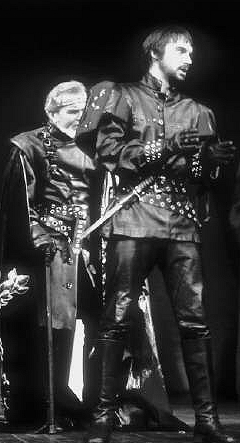To the question of why Hal dropped out of court life, Emrys James's King supplies one answer. He is a father any son would be glad to escape; a snarling, sardonic, guilt-laden autocrat preserving much of the hyena-like quality brought by this actor to King John. Throwing a coin down to enforce an argumentative point with Hotspur he breaks his formal exit to come back and pick it up. If any strain of meanness lingers in Hal's character, it is clear where he got it from.
The production, in short, encourages you to concentrate on the old values of individual character rather than on any panorama of English society. Farrah's stage is a slightly tilted wooden platform that is apt to become progressively encumbered with the debris of previous scenes, including a gigantic stepladder where Hal and the King are periodically stationed as eavesdroppers on distant events. The King observes Eastcheap; Hal studies the apoplectic excesses of the dreaded Hotspur (Stuart Wilson). This is the show's one directorial licence and it is unnecessary. There is enough in the text to demonstrate how speedily the adversaries' intelligence service worked.
The production wholly achieves its first purpose in showing Howard's mooncalf Hal developing step by step to the modest chivalry of Shrewsbury. Perhaps in obedience to this, a good many other parts are reduced to supporting roles. Most interesting among them are George Baker's icily, amiable Worcester, revealed as the main agent of Hotspur's downfall, and Ann Hasson's spitfire Lady Percy, whose dealings with Hotspur suggests the married lives of Kate and Petruchio.
